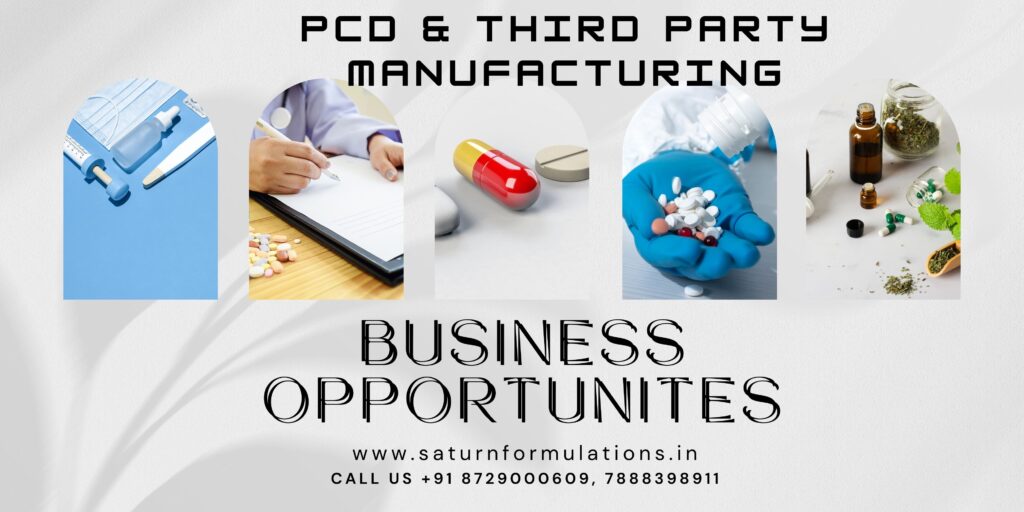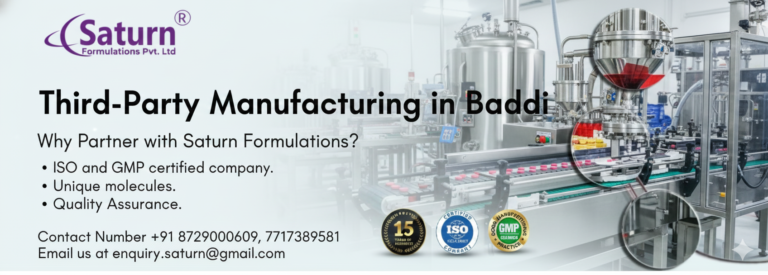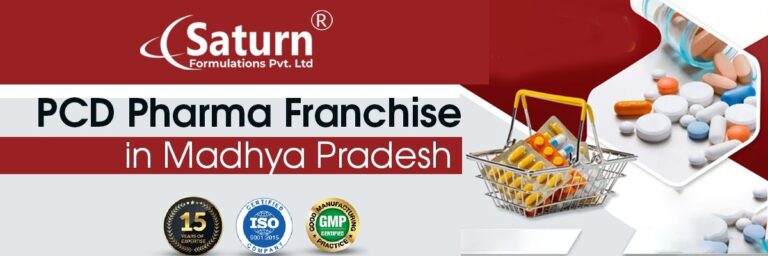What are the demands in Pharmaceutical Industry – Saturn Formulations
What are the demands in Pharmaceutical Industry
What makes Saturn Formulations Unique or What are the demands in the Pharmaceutical Industry :- Product Range (We are the largest pharma franchise companies in India, as it offers wide range of products across division like)
Gynaecology Product Franchise – Pediatric Product Franchise – Derma Product Franchise – Ortho Product Franchise – Cardiac Diabetic Product Franchise – Injectable Product Franchise – Herbal Ayurveda Product Franchise
INDEX
- How do I start a PCD Pharma franchise?
- What are the requirements for a pharmaceutical franchise?
- Which are the top PCD pharma franchise companies in India?
- How much investment is needed for a pharma franchise?
- What is the difference between PCD Pharma and third-party manufacturing?
- Which documents are required for a pharma franchise?
- What is third party pharma manufacturing?
- How to find a third-party manufacturer for pharmaceuticals?
- What are the regulations for manufacturing medicines in India?
- What is GMP certification in pharmaceuticals?
- How much does it cost to manufacture a pharmaceutical product?
- Which medicines are in high demand?
- What is the future of the pharmaceutical industry?
- What are the most profitable pharmaceutical products?
- Which are the top pharma brands in India?

1. How do I start a PCD Pharma franchise?
Answer: To start a PCD Pharma Franchise research for reputable companies, obtain the necessary licenses and registration, build a business plan, choose your required products, and focus on marketing and build relationships with doctors and healthcare professionals.
- Research and Select a PCD Pharma Company: Look for a company with a strong track record, good market presence, and wide range of Products.
- Evaluate Product Portfolio: Assess the company’s product range and ensure it aligns with your target market and business goals.
- Check Product Portfolio and Certifications: Verify that the products are of high-Quality and meet relevant industry standards and certifications.
- Consider Monopoly Rights and Territory Allocation: Understand the terms of the franchise agreement which includes monopoly rights or territory allocation.
Acquire licenses and Legal Documents:
- Drug License: Obtain the necessary drug license to sell stock and distribute the pharmaceutical products.
- GST Registration: Secure GST registration for Legal and financial Operations
- Other Licenses and Registration: Obtain any other relevant licenses or registrations required by local authorities.
- Company Registration: Register your company with the Registrar of Companies (ROC)
- Partnership Deed (If applicable): If you are building a partnership always make sure you have a partnership deed.
- Rent Agreement or Property Documents: Have a Valid Rent agreement or property documents for your Business Premises.
- Bank Account Details: Share your bank account details for financial transactions.
- NOC from the Manufacturer: Obtain a No Objection Certificate (NOC) from the Manufacturer.
- Product List and Price List: Ask the manufacturer to send the product list and price List
- Trade License: Acquire a business license from the local authorities.
Promotional Materials: Check with the company about the promotional and marketing material.
2.What are the requirements for a Pharmaceutical Franchise?
If you are planning to start a pharmaceutical franchise and you need to provide several documents to get started. These documents are necessary to ensure that business is operating legally and in compliance with all relevant laws and regulations. Here are some of documents you need:
- Drug License: A drug license is a legal permit issued by the State Drug control organization or drug standard control organization (CDSCO) that allows you to sell Pharma Franchise products. This is an important document you require to start a pharma Franchise.
- GST Registration: You are required to register on GST (Goods and Service Tax) in order to run your pharma Franchise. This is an easy process that can be done online through the GST Portal.
- Trademark Registration: Trademark registration helps in protecting your brand name, logo and other proprietary symbols from being used by other companies. This is an important step to protect your brand and prevent others from compromising your property.
- FSSAI Registration: If you plan to sell food Supplement or Nutraceutical you will need to register with the food safety and standards authority of India (FSSAI).
- Rent Agreement or Property Documents: If you are renting a space for your pharma franchise business you will need to provide a rent agreement or property documents to show that you have a valid place of business.
- Pan Card: You will need a PAN (Permanent Account Number) card for financial transactions and to file taxes. PAN Card is another most important document to start PCD Pharma Franchise Business.
- Identity and address Proof: You will need to provide your identity and address proof such as aadhar card, Voter ID Card, passport or driver license.
- Bank Account Details: Once must attain a business bank account to manage finances.
Franchise Agreement: Sign a formal agreement with the pharmaceutical company (the franchisor) outlining the terms of the franchise.
3. Which are the Top PCD pharma Franchise Company in India?
Answer: Some of the Top PCD Pharma Franchise company in India include Plenum Biotech, Saturn Formulations, Stenhil Labs, Lifevision Healthcare, Cipla, Mankind Pharma, Kyna Pharmaceutical, Albia Biocare, and more.
- Plenum Biotech: They are known as a leading and reputed PCD Pharma Franchise and third party manufacturing in India
-
- Saturn Formulations: A company that is often included in the lists of Top PCD Pharma Franchise companies in India.
- Stenhil Labs: A well known pharma company that has presence in the PCD Franchise model.
- Mankind Pharma: Another well-known pharmaceutical company with a PCD Franchise business.
- Lifevision Healthcare: A company which offers business opportunity across the nation
-
- Cipla: A company known for its quality and efficacy of products
- Kyna Pharmaceutical: A leading PCD Pharma Franchise company in India which has main focus on quality and services.
Albia Biocare: A company based in Punjab and known for its Pharma Franchise opportunity.
4. How much investment is needed for a pharma franchise?
Answer: Starting a PCD Pharma Franchise in India generally requires an initial investment ranging from Rs. 50000 to Rs 200000 depending on factors such as product range, Territory size, marketing strategy, and more. Let’s Breakdown the costs involved:
- Initial Investment:
- Franchise Fee: Rs 50000 to Rs 500000
- Inventory Purchase: Rs 200000 to Rs 100000 ( Depending on product range and inventory)
- Marketing and Promotional Expenses: Rs 100000 to Rs 500000
- Infrastructure Setup: Rs 50000 to Rs 200000
- Staffing Cost: Rs 100000 to Rs 500000 annually (Depending on Staff Size)
Key Considerations:
- Product Range: The initial inventory cost depends on the type of medicine and the quantity you choose to purchase.
- Territory Size: Larger territory might require a higher initial investment for marketing and staffing.
- Marketing Strategy: Allocate funds for marketing and promotional activities for building brand awareness and attracting customers.
- Legal Requirements: Obtain necessary licenses and registration which includes Drug License Number (DLN) and GST Registration.
- Infrastructure: Considering the cost of renting or setting up office space, warehousing and transportation.
Staffing: If you plan to hire staff include factors such as salaries, benefits, and training costs.
5. What is the difference between PCD Pharma and third-party manufacturing?
PCD Pharma focuses on distributing and marketing of a parent company’s products through a franchise network while third party manufacturing involves outsourcing the production of products to another company allowing the brand owner to focus on their core competencies such as marketing and sales.
PCD Pharma Franchise
- Core Competencies: Distribution, sales, and marketing of a pharmaceutical company’s product in their specific territory area.
- Business Model: A pharmaceutical company provides monopoly rights to its franchise partners to distribute and promote its products.
- Control: Franchise holders have exclusive rights to market and sell the parent company products within their designated area.
- Investment: PCD Pharma Franchise generally need initial investment as compared to setting up a complete manufacturing facility.
- Benefits: Access to a wide range of products, established brand reputation, and marketing support from the parent company.
Third Party Manufacturing
- Focus: Outsourcing the manufacturing of pharmaceutical products to another company
- Business Model: A pharmaceutical company contracts with a Third Party Manufacturing in pharma to produce its products under its own brand name.
- Control: The Brand owners have control over branding, formulation, and marketing while the third party manufacturer handles the production
- Investment: Third Party manufacturing generally requires a higher initial investment due to the need for research, development, and potentially regulatory compliance.
Benefits: Flexibility in production volumes, scalability, and the ability to focus on marketing and sales rather than manufacturing.
6. Which documents are required for a pharma franchise?
To Launch a pharma Franchise in India you need to have a Drug License, GST registration, trade license, company registration, Business bank account, and franchise agreement.
Here is more detailed breakdown of the essential Documents:
- Drug License: This is one of the most important documents which is a legal permit that is issued by the state drugs control organisation or Central Drugs standard control organisation (CDSCO) authorizing you to sell or distribute medicines.
- GST Registration: Registration for Goods and Service tax is important for any business which includes a Pharma Franchise.
- Trade License: Obtain a trade license from your Local authority to legally operate your business.
- Company Registration: Register your business (proprietorship, partnership, or limited company)
- Bank account: You will need to have a Business bank account to manage your finances.
Franchise Agreement: A legally binding agreement with the franchisor having all the terms and conditions of your partnership.
7. What is third Party Pharma Manufacturing?
Third Party Pharma Manufacturing involves a pharmaceutical company outsourcing the production of its medicines to a specialized manufacturer, allowing the original company to focus on research, marketing and distribution.
-
- Outsourcing: Pharmaceutical companies can choose to outsource the manufacturing process to third party manufacturers rather than building and operating their own facilities.
- Specialized Expertise: Third Party Manufacturer have the expertise and resources to handle the complexities of pharma production from sourcing raw materials to quality testing and packaging.
- Core Competencies: By outsourcing manufacturing, pharmaceutical companies can concentrate on their core competencies that is research and development, marketing, and sales.
-
- Cost-Effectiveness: This approach is cost-effective as it avoids the significant capital investment required for building and maintaining manufacturing facilities.
- Regulatory Compliance: Third Party Manufacturer are generally well-versed in industry regulations and standards that ensure the products are manufactured to the required quality and safety standards.
- Flexibility and Scalability: Contract Manufacturer generally offer flexibility and scalability in production. Pharmaceutical companies can increase or decrease production volumes based on the market demand without the need to invest in additional infrastructure.
8. How to find a Third Party Manufacturer for Pharmaceuticals?
To find the best Third Party Manufacturer in Pharma, research for companies having good reputation, check for certification such as WHO-GMP, ISO, and FDA and assess their manufacturing capabilities, quality control protocols and cost-effectiveness.
- Research and Shortlisting:
- Online Research: Start by researching companies online focusing on those having a strong reputation in the pharmaceutical industry.
- Check Website and Social Media: Visit their websites and social media pages to know their services, products, and client reviews.
- Industry Forums and Networks: Engage with industry professionals and attend relevant events to gather insights and recommendations.
- Key Factors to Consider:
- Certifications and Compliance: Ensure the manufacturer holds relevant certifications like WHO-GMP, ISO, FDA that demonstrate adherence to quality and regulatory standards.
- Manufacturing Capabilities: Assess their production capacity, infrastructure and the type of formulations that they can handle.
- Quality Control: Evaluate their quality assurance protocols and maintain the record of maintaining high-Quality Standards.
- Product Range: Check if they offer the specific type of formulations you need and if they have experience in your area of interest.
- Reputation and Client Reviews: Research the company’s track record, client testimonials and online review to look for their reliability and customer satisfaction.
- Cost-Effectiveness: Compare the pricing and ensure it aligns with your budget and business objectives.
- On-Time Delivery: Look for a manufacturer known for On-Time product delivery and reliable supply chain management.
- Experience and Expertise: Make sure the manufacturer has experience in producing the products which fulfil your requirement.
- Regulatory Compliance: Ensure the manufacturer complies with all relevant regulatory regulations and certifications in the industry.
- Production Capacity: Check to see if the manufacturer can fill out your production requirements.
-
- Some of the Third Party Manufacturing Company in India: Plenum Biotech, Saturn Formulations, Stenhil Labs, Sonalika Lifesciences, Nimbles Biotech, Pidloma Healthcare, Casca Remedies, and more.
- Important Considerations:
- Contract Manufacturing: Look for the terms and conditions of contract manufacturing agreement which includes intellectual property rights and confidentiality.
- Supply Chain Management: Ensure the manufacturer has a robust supply chain to guarantee on-time and reliable delivery of raw materials and finished products.
- Risk Management: Identify and mitigate potential risks associated with Third Party Manufacturing that include supply chain disruptions and quality issues.
9. What are the regulations for manufacturing medicines in India?
In India, manufacturing medicine is regulated by the drugs and Cosmetic Act. 1940 and related rules hence they ensure quality, safety, and efficacy through licensing, inspection and adherence to Good Manufacturing Practices (GMP) outlined in Schedule M.
- Drugs and Cosmetic Act, 1940: This is the primary legislation governing the import, manufacture, distribution and sales of drugs and cosmetics in India.
-
- Drugs and Cosmetic Rules, 1945: These rules provide the framework for implementing the drugs and cosmetics Act including procedure for testing and licensing new drugs.
- Central Drugs Standard Control Organisation (CDSCO): It is the main regulatory body for the pharmaceutical sector that is responsible for ensuring the quality, safety and efficacy of drugs.
- Ministry of Health and Family Welfare (MoHFW): This ministry is responsible for formulating and implementing health policies which include those related to pharmaceuticals.
- Ministry of Chemicals and Fertilizers: This ministry supervises the pharmaceutical sector, covering drug production and regulation.
-
- State Licensing Authorities (SLAs): State agencies oversee the production and distribution of drugs within their jurisdictions, issuing licenses for manufacturing facilities and retail establishments.
- Drug Controller General of India (DCGI): The DCGI leads the CDSCO and is responsible for approving new drugs and medical devices for marketing and distribution.
Key Requirements for Pharmaceutical Manufacturers:
- Licensing: Manufacturers need to obtain licenses from the relevant authorities (Central or State) for each drug and manufacturing location.
- Quality Standards: Drugs should meet prescribed quality standards and be safe, effective and fit for their required use.
- Good Manufacturing Practices (GMP): Manufacturer should adhere to GMP guidelines that is outlined in Schedule M of the drugs and Cosmetic Rules, 1945.
- Labeling and Packaging: Drugs must be labeled and packaged per specific guidelines to ensure consumers receive essential information.
- Testing and Analysis: Manufacturers must perform thorough testing and analysis of their products to guarantee quality and safety.
- Post-Market Surveillance: Manufacturers must track their products’ market performance and report any adverse events to regulatory authorities.
Import Registration: Foreign manufacturers and their importers in India must complete import registration to legally sell approved medical devices in the country.
10. What is GMP certification in pharmaceuticals?
In the Pharmaceutical industry, GMP certification or Good Manufacturing practice certification, signifies which a manufacturer follows quality standards in producing medicines that ensures consistent quality and safety.
Good Manufacturing practices (GMP) are a system of regulations and guidelines which ensures pharmaceutical products are consistently produced and controlled according to quality standards.
GMP aims to minimize risks in pharmaceutical production which cannot be eliminated through testing the final product that ensures patients can rely on medicines meeting the highest quality standards.
A GMP certificate demonstrates a company adheres to GMP principles in its manufacturing processes, covering aspects such as quality management, sanitation, facilities, equipment, raw materials, personnel, validation and documentation.
11. How much does it cost to manufacture a pharmaceutical product?
Manufacturing a Pharmaceutical product is an expensive process that costs around a range of Rs.6 to Rs.12 Lakhs for a small scale unit which potentially exceeds Rs 10 crores for a large scale facility depending on the complexity of the product and scale of operations.
Here is breakdown of the costs that involves in pharmaceutical manufacturing:
- Initial Investment:
- Small Scale Unit: Rs 50 Lakh to Rs 2 Crores
- Medium Scale Unit: Rs 2 Crore to Rs 10 Crore
- Large Scale Unit: Rs 10 Crore and above
Factors influencing Initial investment: Location, regulatory requirements, quality standards, and the complexity of pharmaceutical products manufactured.
12. Which medicines are in high demand?
In 2025 medicines for oncology, immunology, diabetes, and obesity along with cardiovascular medications are expected to be in high demand that is driven by innovative treatments and increasing prevalence of related conditions.
Here’s a breakdown of specific drug categories and examples:
Some of the Therapeutic Area with High Demand:
-
- Oncology: With the regular innovative and effective treatment of cancer this particular is seeing significant growth.
- Immunology: While growth might be slower due to biosimilars this area is important.
- Diabetes and Obesity: Demand for Medications in this particular area is expected to continue to rise.
- Cardiovascular: Medications for managing cardiovascular disease are consistently in high demand.
- Antihyperglycemic: Useful for managing type 2 Diabetes.
- Statins: It is used in managing cholesterol.
- Antibiotics: Demand for Antibiotics amoxicillin and azithromycin.
- Antidepressants: Due to increasing mental health conditions demand for antidepressants is on all time high.
- Derma Medicines: As the increasing skin care awareness and skin condition.
- Vasodilators: It is used in managing conditions such as hypertension and improved blood flow.
- Mineralocorticoid Receptor Antagonists: Helpful in treating Hypertension.
- Alpha Blockers: Used to facilitate easier urine flow by relaxing bladder neck muscles and the prostate.
13. What is the future of the pharmaceutical industry?
The Pharmaceutical industry future is marked by advancements in AI, personalized medicine, digital health and with a focus on prevention, prediction, and point-of-care solutions while addressing challenges such as escalating costs and regulatory complexities.
Here is more detailed look at the key trends shaping the future of the pharmaceutical industry:
- Technological Advancements:
- Artificial Intelligence (AI): It is expected that AI is expected to revolutionize drug discovery and development, accelerating the process and reducing costs.
- Digital Therapeutics: All the digital tools and platforms are becoming increasingly important for patient engagement, monitoring, and treatment adherence.
- Gene Editing and Cell Therapies: These technologies are paving the way for new treatment for previously untreatable disease.
- Continuous Manufacturing: This approach improves efficacy and precision in pharmaceutical production.
- Pharma 4.0 and 5.0: The industry is moving towards more connected, data driven, and collaborative manufacturing processes.
- Shift Towards Personalized Medicine:
- Tailored Treatment: Main focus is on developing treatments which are specific to individual patient characteristics that is genetics and lifestyle
- Precision Medicine: Using data and technology to predict and prevent disease as well as personalize interventions.
- 3. Focus on Prevention and Early Detection:
- Preventive Healthcare: Focus on addressing risk factors and promoting healthy lifestyles to prevent disease.
- Early Detection: Developing tools and methods for early detection of disease, enabling timely intervention.
- 4. Challenges and Opportunities:
- Escalating Costs: The high cost of drug development and treatment remains a major challenge.
- Regulatory Complexity: Navigating evolving regulations and ensuring compliance is important.
- Supply Chain Management: Ensuring efficient and reliable supply chain is important.
- Sustainability: Addressing environment and social impact is becoming increasingly important.
- Talent Shortages: The industry needs to attract and retain skilled professionals.
- Competition: The pharmaceutical industry faces increasing competition from generics, biosimilars, and new entrants.
- Data and AI: Companies need to invest in data and AI to foster innovation and reduce drug development costs and timelines.
14. Which are the top pharma brands in India?
Some of the Top pharmaceutical brands in India that are known for their market capitalization and influence includes Saturn Formulations, Plenum Biotech, Stenhil Labs, Sun Pharmaceutical, Cipla, Dr Reddy’s Laboratories, Zydus Lifesciences.
Here is more detailed look at some of the leading pharmaceutical companies in India:
- Saturn Formulations: Another major player, Saturn formulations has a main focus on affordable pharmaceutical products and its presence across the nation.
- Plenum Biotech: A leading player in the India pharmaceutical industry known for its wide range of products and Pan India Presence.
- Stenhil Labs: A well-established company emphasis on research and development, particularly in the areas of generics and biosimilars.
- Sun Pharmaceutical: Leading company having global presence and vast product range.
- Cipla: A global pharmaceutical company having a strong presence in India which is known for its innovative medicines and vaccines.
- Dr Reddy’s Laboratories: A well-established company having its focus on branded generics and presence in several therapeutic areas.
- Zydus Lifesciences: A Global Pharmaceutical company which focuses on generic products and its research and development capabilities.
- Mankind Pharma: It is known for its consumer healthcare products and branded generics.
- Torrent Pharmaceutical: A pharma company which has presence in various therapeutic areas and known for its focus on branded generics.
- Divi’s Laboratories: A company in the pharmaceutical ingredients and intermediates sector.
15. What are the most profitable pharmaceutical products?
The most profitable pharmaceutical products generally fall into categories with high demand, strong patent protection and chronic use. Here are some of the most profitable types of pharmaceutical products:
- Chronic Disease Medication:
- Diabetes Medications that is Insulin, Metformin, Glimepiride & Metformin Combinations
- Hypertension and Cardiovascular Drugs that is Atorvastatin, Losartan, Telmisartan
- Thyroid Hormone Replacement that is Levothyroxine
- Neurology and Psychiatry Drugs:
- Antidepressants & Anti-Anxiety Medications
- Epilepsy and Neuropathy Medications- Pregabalin, Gabapentin
- Pain Management & Anti-Inflammatory Drugs:
- NSAIDs- Aceclofenac
- Muscle Relaxants- Thiocolchicoside
- Antibiotics and Antivirals
- Broad Spectrum Antibiotics- Amoxicillin Clavulanate, Azithromycin
- Antifungal and Antiviral Drugs- Luliconazole, Acyclovir
- Gastrointestinal Medications
- Proton Pump Inhibitors (PPIs)- Pantoprazole, Rabeprazole
- Digestive Enzymes and Liver Tonics- Silymarin, L-Ornithine L-Aspartate
- Nutraceuticals & OTC Products
- Multivitamins & Immunity Boosters- Ferrous Bisglycinate, Vitamin C, Omega-3
- Collagen & Anti-Aging Products- Glutathione, Niacinamide Serum
- Dermatological & Aesthetic Products
- Skin & Hair Care Products- Minoxidil for hair growth, Glutathione serums
- Anti-Acne & Pigmentation Creams- Niacinamide, Kojic Acid
- Sexual Health & Hormonal Products
- Erectile Dysfunction & Performance Enhancers- Sildenafil, Tadalafil
- Hormone Replacement Therapies- Medroxyprogesterone, Allylestrenol



